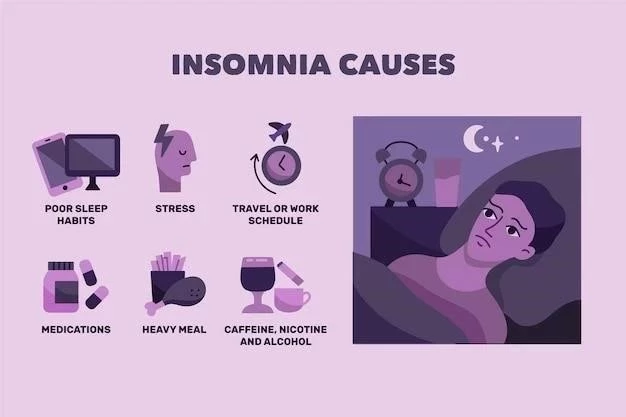Prednisone Insomnia

Prednisone is a corticosteroid medication that is commonly prescribed to reduce inflammation in the body. It is often used to treat a variety of conditions, such as asthma, allergies, and autoimmune diseases. While prednisone can be an effective treatment for these conditions, it can also cause a number of side effects, including insomnia.
Causes of Prednisone-Induced Insomnia
Prednisone-induced insomnia is thought to be caused by a number of factors, including⁚
- Increased cortisol levels⁚ Prednisone can increase the levels of cortisol in the body, which can lead to increased alertness and difficulty falling asleep.
- Stimulation of the central nervous system⁚ Prednisone can stimulate the central nervous system, which can also lead to increased alertness and difficulty falling asleep.
- Changes in sleep-wake cycles⁚ Prednisone can disrupt the body’s natural sleep-wake cycles, making it more difficult to fall asleep at night and wake up in the morning.
- Other side effects of prednisone⁚ Other side effects of prednisone, such as anxiety and increased heart rate, can also contribute to insomnia.
It is important to note that not everyone who takes prednisone will experience insomnia. However, it is a common side effect, especially at high doses or when taken for long periods of time.
Symptoms of Prednisone-Induced Insomnia
The symptoms of prednisone-induced insomnia can vary from person to person, but may include⁚
- Difficulty falling asleep
- Frequent waking during the night
- Early morning awakening
- Non-restful sleep
- Fatigue during the day
- Irritability
- Difficulty concentrating
If you are experiencing any of these symptoms, it is important to talk to your doctor. They can help you determine if your insomnia is caused by prednisone and recommend ways to manage it.
It is also important to note that prednisone-induced insomnia can be a sign of an underlying medical condition. If you are experiencing new or worsening insomnia after starting prednisone, it is important to see your doctor to rule out any other potential causes.
Diagnosis of Prednisone-Induced Insomnia
Diagnosing prednisone-induced insomnia can be challenging, as there is no single test that can definitively confirm the diagnosis. However, your doctor may suspect prednisone-induced insomnia if you are experiencing insomnia and you are taking prednisone.
Your doctor will likely ask you about your symptoms, medical history, and current medications. They may also perform a physical exam and order blood tests to rule out other potential causes of your insomnia.
If your doctor suspects that your insomnia is caused by prednisone, they may recommend that you stop taking the medication for a short period of time to see if your insomnia improves. However, it is important to note that you should not stop taking prednisone without first talking to your doctor, as this could lead to serious side effects.
If your insomnia does not improve after stopping prednisone, your doctor may recommend other treatments, such as lifestyle modifications, medications, or alternative therapies.
Treatment Options for Prednisone-Induced Insomnia
Treatment options for prednisone-induced insomnia may include⁚
- Lifestyle modifications
- Medications
- Alternative therapies
Your doctor will recommend the best treatment option for you based on your individual needs and circumstances.
Lifestyle Modifications
There are a number of lifestyle modifications that you can make to help improve your sleep if you are experiencing prednisone-induced insomnia. These include⁚
- Establishing a regular sleep schedule⁚ Going to bed and waking up at the same time each day, even on weekends, can help to regulate your body’s natural sleep-wake cycle.
- Creating a relaxing bedtime routine⁚ This could include taking a warm bath, reading a book, or listening to calming music.
- Avoiding caffeine and alcohol before bed⁚ These substances can interfere with sleep.
- Creating a comfortable sleep environment⁚ This means making sure your bedroom is dark, quiet, and cool.
- Getting regular exercise⁚ Exercise can help to improve sleep quality, but it is important to avoid exercising too close to bedtime.
If you are having trouble sleeping, it is important to talk to your doctor. They can help you determine if your insomnia is caused by prednisone and recommend ways to manage it.
Medications
There are a number of medications that can be used to treat prednisone-induced insomnia. These include⁚
- Benzodiazepines⁚ These medications can help to promote relaxation and sleep. However, they can also be habit-forming, so they should be used with caution.
- Non-benzodiazepine sedatives⁚ These medications are similar to benzodiazepines, but they are less likely to be habit-forming.
- Antidepressants⁚ Some antidepressants, such as trazodone and mirtazapine, can also be used to treat insomnia.
Your doctor will recommend the best medication for you based on your individual needs and circumstances. It is important to note that some medications may interact with prednisone, so it is important to tell your doctor about all of the medications you are taking.
Alternative Therapies
There are a number of alternative therapies that may help to improve sleep if you are experiencing prednisone-induced insomnia. These include⁚
- Cognitive-behavioral therapy (CBT)⁚ CBT is a type of talk therapy that can help you to learn how to manage your thoughts and behaviors that are contributing to your insomnia.
- Mindfulness meditation⁚ Mindfulness meditation can help you to relax and focus on the present moment, which can be helpful for falling asleep.
- Yoga⁚ Yoga can help to reduce stress and improve sleep quality.
- Acupuncture⁚ Acupuncture is a traditional Chinese medicine technique that involves inserting thin needles into the skin at specific points on the body. Acupuncture may help to improve sleep quality by reducing stress and anxiety.
It is important to note that alternative therapies are not a substitute for medical treatment. However, they may be helpful in conjunction with medication or other treatments.
Prevention of Prednisone-Induced Insomnia
There is no surefire way to prevent prednisone-induced insomnia, but there are a few things you can do to reduce your risk of developing this side effect. These include⁚
- Taking prednisone at the lowest dose possible⁚ The higher the dose of prednisone you take, the more likely you are to experience insomnia.
- Taking prednisone for the shortest period of time possible⁚ The longer you take prednisone, the more likely you are to experience insomnia.
- Taking prednisone in the morning⁚ Taking prednisone in the morning can help to minimize the effects of the medication on your sleep.
- Avoiding caffeine and alcohol before bed⁚ These substances can interfere with sleep.
- Creating a relaxing bedtime routine⁚ This could include taking a warm bath, reading a book, or listening to calming music.
If you are having trouble sleeping while taking prednisone, talk to your doctor. They may recommend lifestyle modifications, medications, or other treatments to help you manage your insomnia.
When to Seek Medical Advice
It is important to seek medical advice if you are experiencing insomnia while taking prednisone, especially if you have tried lifestyle modifications and over-the-counter sleep aids without success. Insomnia can be a sign of an underlying medical condition, so it is important to rule out any other potential causes.
You should also seek medical advice if your insomnia is severe or if it is interfering with your daily life. Insomnia can lead to fatigue, irritability, difficulty concentrating, and other problems.
Your doctor can help you determine if your insomnia is caused by prednisone and recommend ways to manage it. They may recommend lifestyle modifications, medications, or other treatments.
Complications of Prednisone-Induced Insomnia
Prednisone-induced insomnia can lead to a number of complications, including⁚

- Fatigue⁚ Insomnia can lead to fatigue, which can make it difficult to concentrate and perform daily tasks.
- Irritability⁚ Insomnia can also lead to irritability and mood swings.
- Difficulty concentrating⁚ Insomnia can make it difficult to concentrate and focus.
- Impaired judgment⁚ Insomnia can also impair judgment and decision-making.
- Increased risk of accidents⁚ Insomnia can increase the risk of accidents, such as car accidents and workplace accidents.
If you are experiencing any of these complications, it is important to talk to your doctor. They can recommend ways to manage your insomnia and reduce your risk of developing these complications.
Managing Prednisone Regimen to Reduce Insomnia
Here are a few tips for managing your prednisone regimen to reduce insomnia⁚
- Take prednisone in the morning⁚ Taking prednisone in the morning can help to minimize the effects of the medication on your sleep.
- Taper prednisone dosage⁚ If possible, your doctor may recommend tapering your prednisone dosage gradually to reduce the risk of insomnia;
Taking Prednisone in the Morning
One way to reduce the risk of prednisone-induced insomnia is to take prednisone in the morning. This is because prednisone levels in the body are highest in the morning and gradually decline throughout the day. By taking prednisone in the morning, you can help to minimize the effects of the medication on your sleep.
If you are currently taking prednisone at night, talk to your doctor about switching to a morning dosing schedule. This may help to improve your sleep quality and reduce your risk of insomnia.
Tapering Prednisone Dosage
Another way to reduce the risk of prednisone-induced insomnia is to taper your prednisone dosage gradually. This means slowly reducing the dose of prednisone you take over time. Tapering prednisone dosage can help to minimize the effects of the medication on your sleep and reduce your risk of insomnia.
If you are currently taking prednisone, talk to your doctor about tapering your dosage. Your doctor will work with you to develop a tapering schedule that is right for you. This schedule will likely involve gradually reducing your prednisone dosage over a period of several weeks or months.
Alternative Treatment Options for Prednisone-Induced Insomnia
If lifestyle modifications and medications are not effective in treating your prednisone-induced insomnia, you may want to consider alternative treatment options. These options include⁚
- Melatonin⁚ Melatonin is a hormone that helps to regulate sleep. Taking melatonin supplements may help to improve sleep quality in people with prednisone-induced insomnia.
- Sleepy tea⁚ Sleepy tea is a type of herbal tea that contains herbs that promote relaxation and sleep. Drinking sleepy tea before bed may help to improve sleep quality in people with prednisone-induced insomnia.
- Relaxation techniques⁚ Relaxation techniques, such as yoga, meditation, and deep breathing, can help to reduce stress and improve sleep quality. Practicing relaxation techniques before bed may help to improve sleep quality in people with prednisone-induced insomnia.
Melatonin
Melatonin is a hormone that helps to regulate sleep. It is produced by the pineal gland in the brain in response to darkness. Melatonin levels rise in the evening and fall in the morning, which helps to promote sleep.
Melatonin supplements may be helpful in treating prednisone-induced insomnia. Melatonin has been shown to improve sleep quality and reduce sleep latency (the time it takes to fall asleep) in people with insomnia.
Melatonin is generally safe for short-term use. However, it is important to talk to your doctor before taking melatonin, especially if you have any underlying health conditions or are taking any medications.
Sleepy Tea
Sleepy tea is a type of herbal tea that contains herbs that promote relaxation and sleep. These herbs include chamomile, lavender, valerian root, and lemon balm.
Sleepy tea may be helpful in treating prednisone-induced insomnia. Chamomile has been shown to reduce anxiety and promote relaxation. Lavender has been shown to improve sleep quality and reduce sleep latency (the time it takes to fall asleep). Valerian root has been shown to improve sleep quality and reduce the number of nighttime awakenings. Lemon balm has been shown to promote relaxation and reduce stress.
Sleepy tea is generally safe for short-term use. However, it is important to talk to your doctor before drinking sleepy tea, especially if you have any underlying health conditions or are taking any medications;
Relaxation Techniques
Relaxation techniques can help to reduce stress and improve sleep quality. Practicing relaxation techniques before bed may help to improve sleep quality in people with prednisone-induced insomnia.
Some relaxation techniques that may be helpful include⁚
- Yoga⁚ Yoga is a mind-body practice that combines physical poses, breathing exercises, and meditation. Yoga has been shown to reduce stress, improve sleep quality, and reduce insomnia.
- Meditation⁚ Meditation is a practice that involves focusing your attention on the present moment. Meditation has been shown to reduce stress, improve sleep quality, and reduce insomnia.
- Deep breathing⁚ Deep breathing is a simple but effective relaxation technique that can help to reduce stress and improve sleep quality. To practice deep breathing, simply inhale slowly and deeply through your nose, and exhale slowly and completely through your mouth.
It is important to find a relaxation technique that works for you and practice it regularly. Practicing relaxation techniques for even a few minutes each day can help to improve your sleep quality.
Prednisone-induced insomnia is a common side effect of prednisone treatment. It can be caused by a number of factors, including increased cortisol levels, stimulation of the central nervous system, and changes in sleep-wake cycles.

There are a number of things you can do to reduce your risk of developing prednisone-induced insomnia, including taking prednisone in the morning, tapering your prednisone dosage, and practicing relaxation techniques;
If you are experiencing prednisone-induced insomnia, talk to your doctor. They can recommend ways to manage your insomnia and improve your sleep quality.